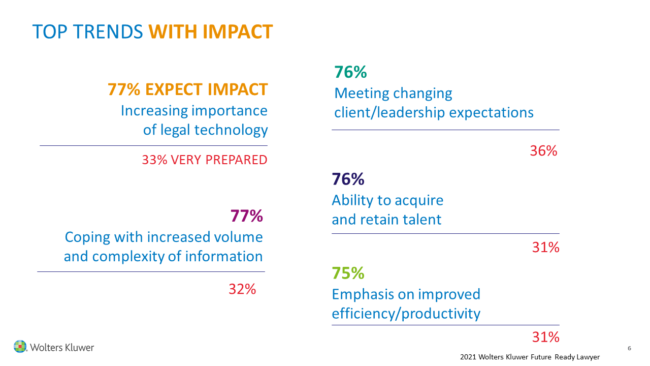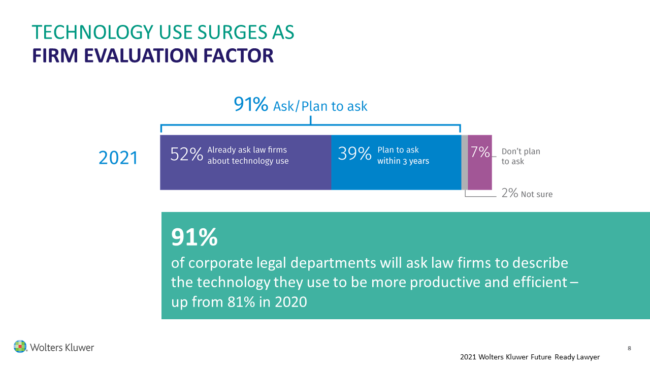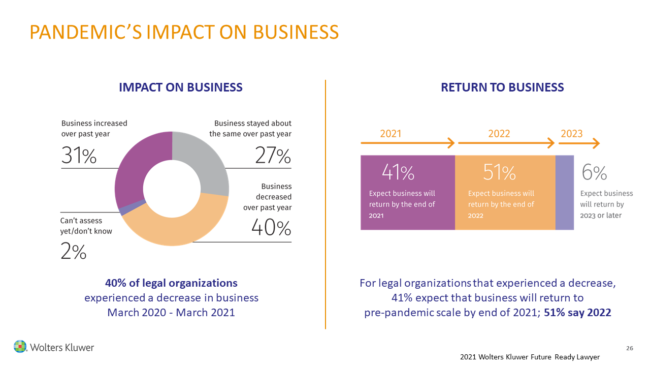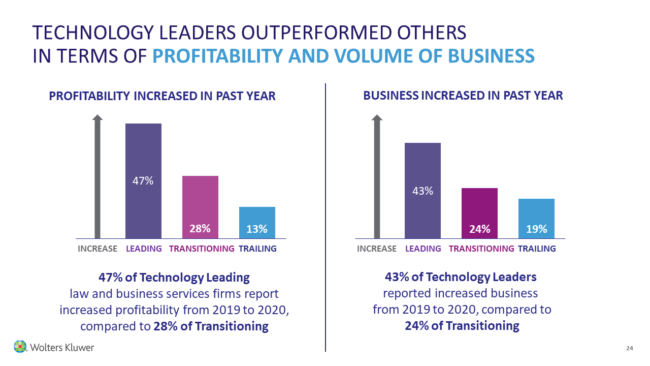Legal professionals agree that the pandemic accelerated the critical role of technology in the future success of their law firms and legal departments, but only a third believe their organizations are well prepared for addressing technology’s increasing importance.
This is a key finding of the 2021 Wolters Kluwer Future Ready Lawyer Survey Report, the third year that Wolters Kluwer Legal & Regulatory U.S. has conducted this survey, designed to provide insights into how the legal profession is evolving and how prepared legal professionals are to face the future.
It polled 700 legal professionals across the U.S. and Europe working in law firms, legal departments and business services firms.
Organizations Poorly Prepared
More than three-quarters of those who responded to the survey identified two trends as having the biggest impact on their organizations over the next three years: the increasing importance of legal technology and the increasing volume and complexity of information.
Yet only 33% said their organizations are very prepared to address the increasing importance of legal technology and only 32% said they are very prepared to address the increased volume and complexity of information.
While those readiness percentages are low, they reflect an improvement over last year’s survey, when just 28% felt their organizations were very prepared for technology’s increasing importance and 29% were very prepared for the greater volume and complexity of information.
Across all areas likely to impact their organizations over the next three years, just 36% said their organizations are very prepared.
“While technology has increasingly become a key enabler for successful law firms and legal departments, the pandemic put a spotlight on how critical it is to business continuity – in supporting the organization and staff, as well as delivering service – and to future resilience,” the survey concluded.
Clients Demand Tech
The increasing importance of legal technology is reflected in corporate clients’ expectations for their outside firms, the survey found.
When considering outside firms, 91% of clients say they now ask or plan to ask the firms to describe the technology they use to be more productive and efficient. That is a 10-point increase over last year’s survey.
“The pandemic and the need for remote and automated solutions likely helped to accelerate the number of legal departments focusing on this as an evaluation criterion,” the survey suggested.
Even when working with current firms, technology is a top priority for legal departments. The survey found that 82% of legal departments say it is important that the firms they work with fully leverage technology.
In fact, of the various criteria clients use to evaluate law firms, use of technology ranked highest, followed by specialization, price, understanding client needs, alternative fee arrangements, and demonstrated process innovation.
In contrast, law firms believed the top criteria clients apply is their ability to understand client needs, with use of technology ranked the third most-important criteria.
Even as legal departments look to their outside firms for greater proficiency in technology, they are expanding their own use of technology, the survey found.
Legal departments plan to increase their investments in technology in the next three years, particularly in technology that can improve their productivity and enhance collaboration and transparency with their outside firms.
Among the leading technologies in which legal departments plan to invest are collaboration tools for document and contract drafting/reviewing, automation of document and contract creation, corporate e-meeting and e-voting management, workflow management and process automation, and document and contract workflow management.
Firms Investing in Tech
As for law firms, they say they are accelerating initiatives to improve efficiency, productivity and client services. Three quarters report they are investing in new technology to support firm operations and client work, 42% are creating dedicated innovation functions or groups, and 42% are formalizing how they collect client feedback.
The percentage of firms planning to increase their technology investment rose slightly this year, from 60% in 2020 to 63%.
Top technologies in which firms plan to invest include e-signatures, automation of document and contract creation, collaboration tools for document and contract drafting/reviewing, document and contract workflow management, and cloud-based services.
Impact of the Pandemic
The survey looked at the impact of the pandemic on the business of law and found that it was uneven.
Forty percent of respondents saw their business decrease during the first year of the pandemic, while 31% saw an increase, and 27% said it stayed the same.
Of those whose businesses declined, the survey asked when they expected to return to pre-pandemic scale. Forty-one percent expected it to return by the end of this year, 51% by the end of 2022, and 6% said it would be 2023 or later.
Of the firms whose businesses increased, half said it increased by 11-20% and another quarter said it increased by more than 20%.
Technology was cited by 91% of firms as important or very important to them in their ability to continue delivering legal services during the pandemic. But most had a rough start at the onset of the pandemic, the survey found, with just 30% saying their organization was very prepared to transition to serving clients remotely.
Asked about the technologies that helped them get through the pandemic, nearly all respondents said that they increased their use of one or more of these:
- Document management.
- Internal collaboration software.
- Microsoft Office applications.
- Contract management.
- External collaboration.
- Secure file sharing/extranet.
- Case/matter management.
- Videoconferencing apps.
- Solutions for corporate meetings management.
As legal organizations emerge from the pandemic, the survey found, legal professionals believe various aspects of remote working will continue to apply in how they work:
- Employees using multiple devices for work: 73%.
- Improving digital skills for working remotely: 68%.
- Prioritize virtual/digital communications with clients: 67%.
- More commonly interact with judges via remote hearings: 67%.
- Percentage of employees working from home: 66%.
- Remote collaboration with colleagues/third parties: 66%.
- Control of work/spending on law firms/legal service providers: 64%.
- Prioritize controlling time/expenses per client/case: 61%.
- Internal staff levels in favor of collaboration with third-party resources: 58%.
Tech Leaders Best Positioned for Future
A hallmark of the Future Ready Lawyer survey is to examine how firms that effectively leverage technology (Technology Leaders) perform as compared to other firms.
Not surprisingly, when the pandemic began Technology Leaders were much better prepared, with 46% of them saying that they were very prepared to support clients remotely, compared to just 20% of Transitioning firms (those that are planning to better leverage technology) and 8% of Trailing firms (those with no plans to better leverage technology).
In addition, Leaders were more likely to have increased both their profitability and their business during the pandemic year, the survey found.
We have yet to fully grasp the short- and long-term impacts of the pandemic, the survey concludes, “but one thing is certain: the digital transformation of the industry gained unprecedented momentum, which continues today.
“In the past year, technology was a lifeline to the legal profession, in serving clients, connecting with colleagues and driving efficiency and productivity. As the industry continues to recover and a ‘new normal’ emerges, technology will be a driving force. The question remains, who will be future ready?’
[Disclosure: The Future Ready Lawyer Survey report included a section of “Insights from Luminaries” on the impact of the pandemic. I was among those who contributed commentary. I received nothing of value for my contribution.]
 Robert Ambrogi Blog
Robert Ambrogi Blog



